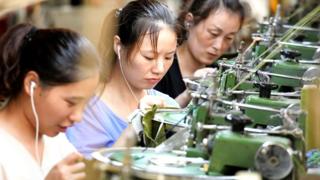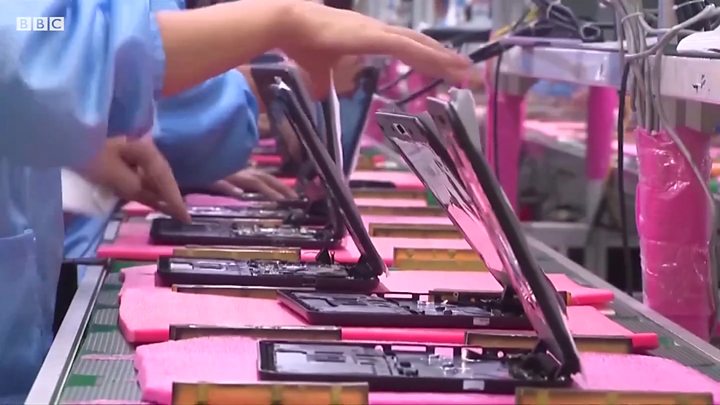 Image copyright
Getty Images
Image copyright
Getty Images
The US is set to increase tariffs on $200bn (£153.7bn) worth of Chinese products on Friday, in a sharp escalation of their damaging trade war.
Tariffs on those Chinese goods will more than double to 25% at 04:01 GMT, and Beijing has vowed to retaliate.
The move comes as high-level officials from both sides hold trade talks in Washington.
Only recently, the two sides appeared to be nearing a deal to end months of hostilities.
The 10% duties on $200bn worth of Chinese products - including fish, handbags, clothing and footwear - were due to rise at the start of the year.
That was delayed as negotiations advanced, but US President Donald Trump is now saying talks are progressing "too slowly".
Even though Mr Trump has downplayed the impact of tariffs on the US economy, the rise will deal a blow to some American companies and consumers as firms may pass on some of the cost, analysts said.
Deborah Elms, executive director at the Asian Trade Centre said: "It's going to be a big shock to the economy.
"Those are all US companies who are suddenly facing a 25% increase in cost, and then you have to remember that the Chinese are going to retaliate."
The Chinese have said they will hit back with "necessary countermeasures". In the past, Beijing has responded immediately to new tariffs imposed by the US on Chinese goods.
The move would mark a sharp escalation of the US-China trade war which has weighed on the global economy over the past year.
The situation could worsen still, as Mr Trump has also warned 25% duties on $325bn of Chinese goods could be introduced "shortly".

Why are the Chinese still taking part in talks?
Despite the heightened tensions, the Chinese travelled to Washington this week to continue talks.
There had been some expectation that they may cancel their trip after Mr Trump's latest threats.
The Asian Trade Centre's Ms Elms said the Chinese want to demonstrate they are taking the process "seriously".
"I am not surprised that they are going because I think the Chinese have always wanted to say that whatever happens in this, it's not their fault," she said.
Both sides have imposed tariffs on billions of dollars worth of one another's goods
Last year, the US imposed duties on $250bn worth of Chinese goods and China levelled duties on $110bn of US products.
Every time the US has made a move, China has sought to match it.
Analysts said the Chinese are still willing to talk after Mr Trump's latest threats because they want to retain the moral high ground in negotiations, while they also recognise the importance of resolving the trade war.
"A trade war will be bad for China, both the real economy and the financial markets. It will also be bad for the world economy," said Gary Hufbauer of the Peterson Institute for International Economics.
"Better for China to play the role of conciliatory statesman than angry retaliator."
Are trade talks doomed?
Not according to former White House International Economics Advisor Clete Willems, who until recently was involved in the US-China trade talks.
Mr Willems said there had been difficult periods in trade negotiations previously and that "we've always managed to get things back on track".
While he expects the tariff hike to go ahead on Friday, he says this wouldn't be the "the end of the game".
"Even if the tariffs do go in place, there is a lot to gain from a deal and hopefully the sides will continue engaging" he said.
Even though there had been growing optimism about progress in trade talks, sticking points have persisted throughout.
These have included issues around intellectual property protection, how fast to roll back tariffs and how to enforce a deal.